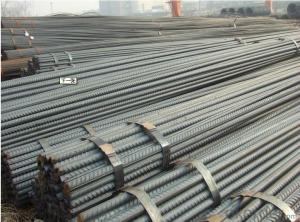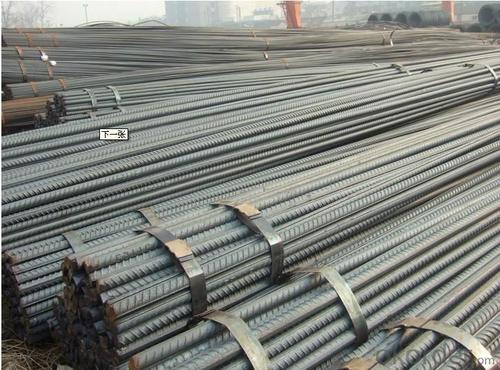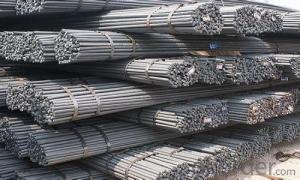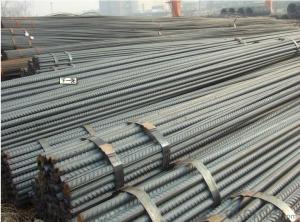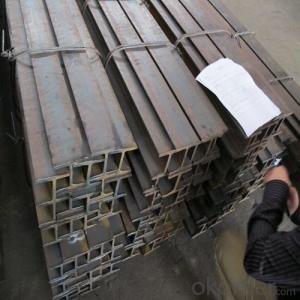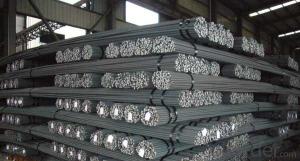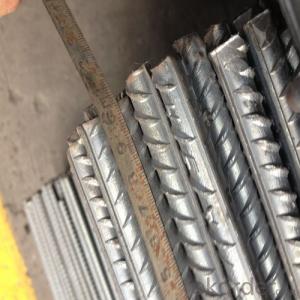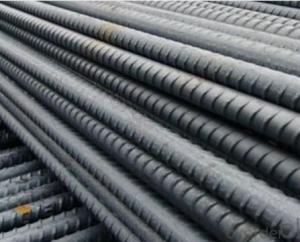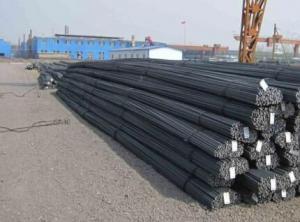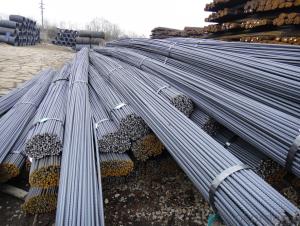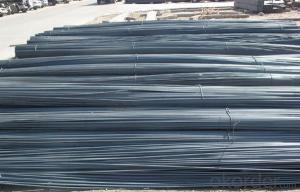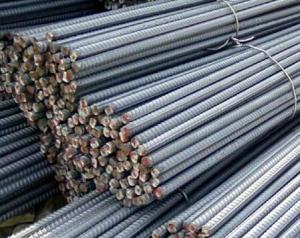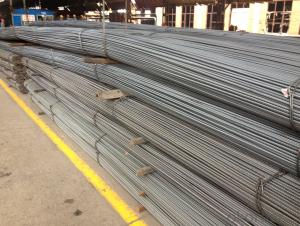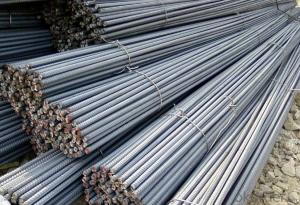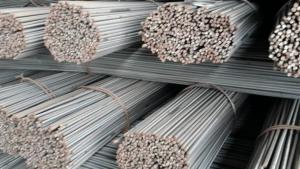ASTM A615 GR40 DEFORMED STEEL BAR
- Loading Port:
- China Main Port
- Payment Terms:
- TT OR LC
- Min Order Qty:
- -
- Supply Capability:
- -
OKorder Service Pledge
OKorder Financial Service
You Might Also Like
Product Description:
Specifications of Deformed Steel Bar:
Standard | GB | HRB335, HRB400, HRB500 | |
UK | G460B, B500A, B500B,B500C | | |
USA | GR40, GR60 | | |
Diameter | 6mm,8mm,10mm,12mm,14mm,16mm,18mm,20mm, 22mm,25mm,28mm,32mm,36mm,40mm,50mm | | |
| | |||
Length | 6M, 9M,12M or as required | | |
Place of origin | Hebei, China mainland | | |
Application | building,construction,road,bridge etc | | |
Brand name | DRAGON | | |
Theoretical weight and section area of each diameter as below for your information:
Diameter(mm) | Section area (mm²) | Mass(kg/m) |
6 | 28.27 | 0.222 |
8 | 50.27 | 0.395 |
10 | 78.54 | 0.617 |
12 | 113.1 | 0.888 |
14 | 153.9 | 1.21 |
16 | 201.1 | 1.58 |
18 | 254.5 | 2.00 |
20 | 314.2 | 2.47 |
22 | 380.1 | 2.98 |
25 | 490.9 | 3.85 |
28 | 615.8 | 4.83 |
32 | 804.2 | 6.31 |
36 | 1018 | 7.99 |
40 | 1257 | 9.87 |
50 | 1964 | 15.42 |
Usage and Applications of Deformed Steel Bar:
Deformed bar is widely used in buildings, bridges, roads and other engineering construction. Big to highways, railways, bridges, culverts, tunnels, public facilities such as flood control, dam, small to housing construction, beam, column, wall and the foundation of the plate, deformed bar is an integral structure material. With the development of world economy and the vigorous development of infrastructure construction, real estate, the demand for deformed bar will be larger and larger..
Packaging & Delivery of Deformed Steel Bar:
Packaging Detail: products are packed in bundle and then shipped by container or bulk vessel, deformed bar is usually naked strapping delivery, when storing, please pay attention to moisture proof. The performance of rust will produce adverse effect.
Each bundle weight: 2-3MT, or as required
Payment term: TT or L/C
Delivery Detail: within 45 days after received advanced payment or LC.
Label: to be specified by customer, generally, each bundle has 1-2 labels
Trade terms: FOB, CFR, CIF
Deformed Steel Bar in Coil
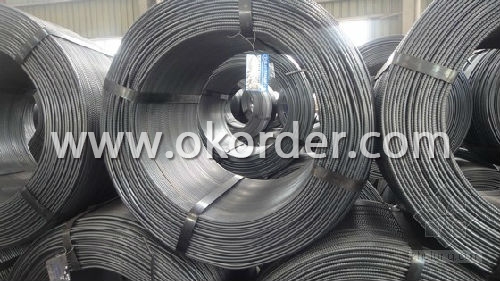
Produce Line of Deformed Steel Bar
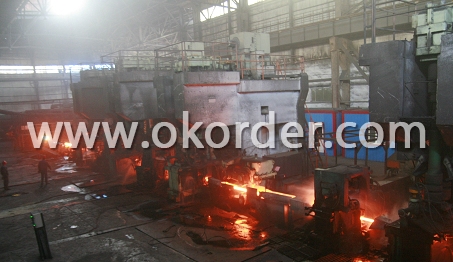
Note:
1. Our products are produced according to national standard (GB), if not, supply according to national standards (GB) or agreement as customer required.
2. Other Grade and Standard Deformed Steel Bar we can supply:
Grade: GR40/GR60, G460B/B500A/B500B/B500C,BST500S
Standard: ASTM, BS, DIN
The Minimum Order Quantity of these products is high, and need to be confirmed.
3. We can not only supply Deformed Steel Bar; if you need anything about building materials, please contact us for further information.
4. Please send us your detail specifications when inquire. We will reply to you as soon as possible. We sincerely hope we can establish a long stable business relationship.
- Q: How do steel rebars contribute to the durability of a structure?
- Steel rebars contribute to the durability of a structure by providing reinforcement and strength to concrete. They help to prevent cracking and structural failure by absorbing and distributing tensile forces, enhancing the overall structural integrity and resilience. Additionally, steel rebars offer resistance to corrosion, ensuring the longevity and durability of the structure.
- Q: How do steel rebars affect the overall lifespan of bridge structures?
- Steel rebars play a crucial role in enhancing the overall lifespan of bridge structures. By reinforcing concrete, rebars increase the tensile strength and structural integrity of the bridge, enabling it to bear heavy loads and withstand various environmental factors such as wind, earthquakes, and temperature fluctuations. This reinforcement prevents cracking, corrosion, and premature failure of the structure, ultimately extending its lifespan and ensuring the safety and reliability of the bridge for an extended period of time.
- Q: What are the different types of steel rebars used in building construction?
- The different types of steel rebars used in building construction include plain carbon steel rebars, epoxy-coated rebars, galvanized rebars, stainless steel rebars, and high-strength rebars.
- Q: What is the role of steel rebars in minimizing the risk of structural collapse?
- Steel rebars play a crucial role in minimizing the risk of structural collapse by enhancing the strength and stability of reinforced concrete structures. They provide additional tensile strength to the concrete, which is otherwise weak in tension. By reinforcing the concrete with steel rebars, the overall load-bearing capacity of the structure increases, making it more resistant to external forces such as earthquakes, winds, and heavy loads. Additionally, rebars help in distributing and transferring the applied loads, reducing the concentration of stress points and preventing cracks or failures in the structure. Therefore, steel rebars act as a vital component in ensuring the structural integrity and safety of buildings and infrastructure.
- Q: Can steel rebars be used in tunnel construction projects?
- Indeed, tunnel construction projects can incorporate steel rebars. As a matter of fact, steel rebars are frequently employed as reinforcement in concrete structures, such as tunnels. They furnish the indispensable robustness and resilience essential for withstanding the loads and pressures tunnels encounter. Typically, the rebars are positioned within the concrete lining of the tunnel, augmenting its structural soundness and averting fissures or cave-ins. Furthermore, steel rebars can be conveniently molded and curved to align with the precise design specifications of the tunnel, rendering them a versatile and pragmatic selection for tunnel construction projects.
- Q: What is the effect of exposure to saltwater on steel rebars?
- Exposure to saltwater can have a detrimental effect on steel rebars, leading to corrosion and structural degradation. The high salt content in seawater acts as an electrolyte, initiating an electrochemical reaction on the surface of the steel, causing it to rust and weaken over time. This can compromise the integrity of reinforced concrete structures, reducing their lifespan and potentially leading to structural failures if not properly maintained or protected.
- Q: How do steel rebars contribute to the energy efficiency of a building?
- Steel rebars contribute to the energy efficiency of a building in several ways. Firstly, steel rebars are used to reinforce concrete structures, such as beams, columns, and walls. This reinforcement helps to increase the structural integrity of the building, allowing it to withstand various loads and forces. This, in turn, reduces the need for excessive materials in the construction process, leading to a more energy-efficient building. Additionally, steel rebars have excellent thermal conductivity properties. This means that they can efficiently transfer and distribute heat throughout the building, helping to regulate the internal temperature. By evenly distributing heat, steel rebars help to minimize temperature fluctuations, reducing the need for excessive heating or cooling systems, thus saving energy. Moreover, steel rebars have a long lifespan and require minimal maintenance. This durability ensures that the building remains structurally sound over time, reducing the need for frequent repairs or replacements. As a result, the energy consumed in maintenance and renovation activities is significantly reduced. Furthermore, the use of steel rebars allows for the construction of larger, open spaces with fewer supporting columns. This design flexibility facilitates the integration of natural light and ventilation, reducing the reliance on artificial lighting and air conditioning systems. By maximizing natural resources, steel rebars contribute to the energy efficiency of the building. In conclusion, steel rebars play a vital role in enhancing the energy efficiency of a building. Their ability to reinforce structures, efficient thermal conductivity, durability, and design flexibility all contribute to reducing the energy consumption associated with construction, maintenance, and operation of the building.
- Q: Are steel rebars suitable for use in aggressive environments?
- Steel rebars are indeed suitable for use in aggressive environments. Steel rebars are commonly used in construction projects, particularly in reinforced concrete structures, due to their high tensile strength and durability. However, in aggressive environments where the rebar is exposed to corrosive elements such as moisture, chloride ions, and chemicals, corrosion can occur, weakening the rebars and compromising the structural integrity of the concrete. To combat this issue, steel rebars are often coated with protective materials like epoxy or zinc to provide a barrier against corrosion. Additionally, stainless steel rebars are also used in aggressive environments due to their superior corrosion resistance properties. In conclusion, while steel rebars are generally suitable for use in aggressive environments, it is crucial to consider the specific conditions and ensure appropriate protective measures are taken to prevent corrosion and maintain the longevity of the reinforced concrete structure.
- Q: Can steel rebars be used in the renovation of historic structures?
- Yes, steel rebars can be used in the renovation of historic structures. The use of steel rebars can help reinforce the existing structure, improve its stability, and ensure compliance with modern safety standards. However, it is important to carefully consider the impact on the historical integrity of the structure and consult with preservation experts to ensure that any modifications are done in a sensitive and appropriate manner.
- Q: Can steel rebars be used in railway and metro construction?
- Yes, steel rebars can be used in railway and metro construction. They are commonly used to reinforce the concrete structures in these types of projects, providing strength and durability to the infrastructure.
Send your message to us
ASTM A615 GR40 DEFORMED STEEL BAR
- Loading Port:
- China Main Port
- Payment Terms:
- TT OR LC
- Min Order Qty:
- -
- Supply Capability:
- -
OKorder Service Pledge
OKorder Financial Service
Similar products
Hot products
Hot Searches
Related keywords
